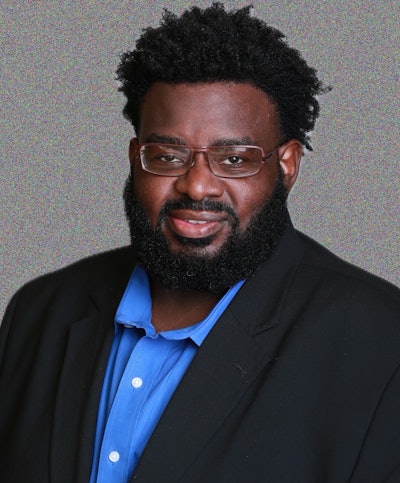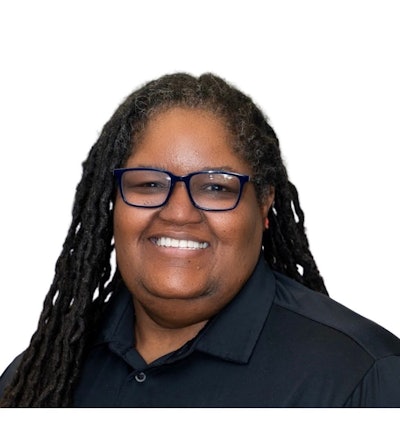 Rev. Dr. Michael A. Hunt
Rev. Dr. Michael A. Hunt
TRIO staff as role models, scholars, and advocates
We are proud products of the communities we serve and of programs like TRIO. Drs. Hunt and Davis, both first-generation college graduates and Baltimore natives, are alumni of the UMBC Meyerhoff Scholars Program. Dr. Hunt directs the McNair Scholars Program, which he participated in as an undergraduate at UMBC. Dr. Davis founded and leads AOP. Dr. Jangha serves as director of Pipeline Programs which includes leading the Upward Bound Math-Science Program. Dr. Corris P.A. Davis
Dr. Corris P.A. Davis
While we each earned STEM undergraduate degrees, we took different paths to obtain our Ph.D.s. Still, each of us was propelled by early access to academic support programs and the belief that higher education can and should be an engine for justice and transformation. That belief is at the core of TRIO, and continues to guide our work.
Staff in TRIO and other student support programs are not just support systems; we are visible models of possibility and experts on student success, embodying our mission of access through our achievements. Our doctorates symbolize what is achievable for low-income, first-generation, and historically marginalized professionals.
Our research: centering equity and access
Our research is firmly rooted in practice. It reflects what we have observed, experienced, and advocated for in our programs and in the lives of the students we serve.
Dr. Michael Hunt - The Voices of Mentees: Exploration of Holistic Critical Mentoring with the UMBC McNair Scholars Program.
Dr. Corris Davis - Beyond the Bachelor’s: The Relationship between Undergraduate Research Participation and the Pathway to Graduate School Enrollment.
Dr. Sundiata Jangha - Starting from the Bottom: The Effects of Participation in Developmental Mathematics on College Outcomes in STEM Fields.
Together, our research highlights a crucial point: equity must be integrated at every level of program design, and TRIO professionals are ideally suited to lead this effort, not only as implementers but also as architects of equity. Dr. Sundiata Jangha
Dr. Sundiata Jangha
Balancing doctoral work, directorship, and life
Earning a Ph.D. while working full-time is not for the faint of heart. Each of us continued to do all of the things that our jobs required, all while taking classes, conducting original research, writing dissertations, caring for our families, and ourselves. What made it possible? Community, purpose, and commitment. This was not about stepping away from our roles to study. It was about stepping more deeply into them, with intention, scholarship, and vision.
A key ingredient in our journey was fostering a supportive culture within our unit. As colleagues, we respected our individual academic journeys, reminded each other of both academic and professional deadlines, and celebrated milestones along the way. We shared notes, papers, and other academic resources. In some cases, we even took classes together. What does that mean for others? Just like when we were kids, everything feels a little easier when you have someone by your side. If there’s no one on staff going through your program with you, take a closer look around — you may be surprised to discover your tribe among fellow learners.
Investing in staff as higher education’s next frontier
We three newly minted Ph.D.s are a testament to AOP’s and UMBC’s commitment to expanding access to higher education for both our staff and students. That commitment is not limited to the three of us. While working in AOP, one former McNair Coordinator (McNair Alum) completed their Ph.D., another former McNair Coordinator (POSSE Alum) is a Ph.D. candidate, and the current McNair Coordinator (McNair Alum) will be starting their Ph.D. in Fall ’25. Our educational journeys, though distinct, share a common thread: we were shaped by the very systems of opportunity and support that we now lead.
How did we do it? We identified resources on campus and within the university system that supported staff education and training, including professional development funds, flexible work policies, tuition remission, and online resources. We openly shared educational opportunities and experiences that would enhance their productivity across our unit. We have fostered a pro-education culture within our unit by talking about our educational journeys, encouraging new staff to consider furthering their education, and creating space within our workplace for those pursuits. We all decided to pursue Ph.D.s, but that doesn’t mean you have to. This applies to any credential that enables staff members to upskill and reach the next level in their careers.
While we are fortunate to work at UMBC, an institution that embodies inclusive excellence, our success is possible at many types of institutions. Our administrative leadership models flexibility and trust, allowing us to thrive in our dual roles as leaders and learners.
In a field where so many staff are first-generation professionals, investing in staff development isn’t a luxury — it’s an imperative. When we pour into our people, we don’t just grow capacity, we build a legacy.
Higher education institutions must go beyond merely investing in students. They must also recognize and support TRIO and student support staff as knowledge producers, educational leaders, and advocates in their own right.
TRIO serves as a long-term pipeline for cultivating equity-driven leadership. Let this be a call to institutions: Fund, support, and champion TRIO not just as a student success initiative, but as an incubator for the next generation of scholar-leaders in higher education.
Rev. Dr. Michael A. Hunt is the director of the University of Maryland, Baltimore County (UMBC) McNair Scholars Program. Dr. Corris P.A. Davis is director of the Office of Academic Opportunity Programs at UMBC. Dr. Sundiata Jangha is director of pipeline programs at UMBC.


















